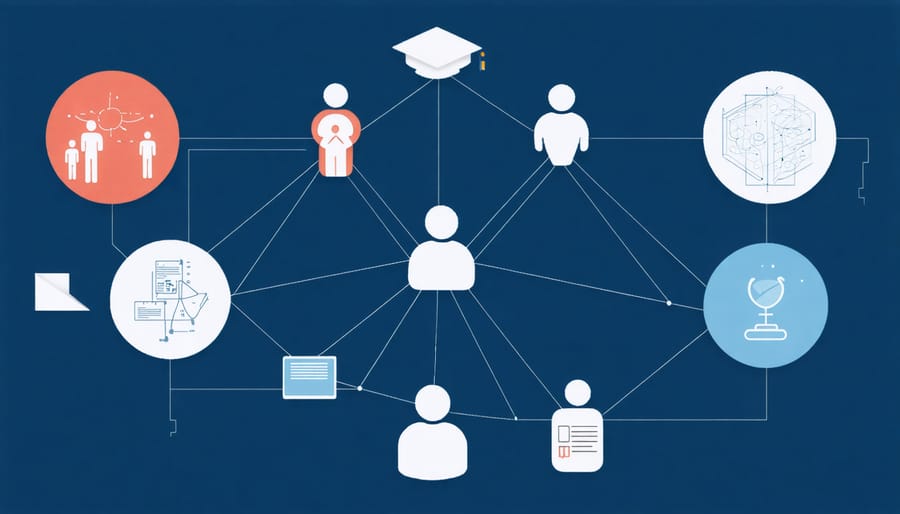Transform the future of mental healthcare through an integrated behavioral health degree – a groundbreaking approach that bridges the gap between traditional mental health services and primary care. This innovative field equips professionals with the expertise to revolutionize school mental health programs and community wellness initiatives.
As mental health challenges continue to rise globally, particularly among young people, the demand for professionals who can seamlessly integrate behavioral health services into various healthcare settings has never been more critical. This specialized degree program combines clinical psychology, public health principles, and healthcare management to create a comprehensive approach to mental wellness.
Students emerge with the unique ability to coordinate care across multiple disciplines, implement evidence-based interventions, and develop sustainable mental health solutions that serve diverse populations. Whether working in schools, healthcare facilities, or community organizations, graduates become catalysts for positive change in how mental health services are delivered and accessed.
The real power of this degree lies in its practical application – transforming fragmented care systems into cohesive, patient-centered approaches that address both mental and physical health needs simultaneously.
Understanding Integrated Behavioral Health Degrees
Core Curriculum Components
Students in an integrated behavioral health degree program explore a carefully designed curriculum that blends mental health care, social work, and healthcare administration. The program typically begins with foundational courses in human development, psychology, and basic counseling skills.
Core coursework includes essential topics like assessment and diagnosis, evidence-based interventions, and cultural competency in healthcare. Students learn about trauma-informed care, family systems theory, and the integration of behavioral health in primary care settings. Special attention is given to crisis intervention and suicide prevention strategies.
The curriculum also emphasizes practical skills through courses in care coordination, electronic health records management, and healthcare policy. Students develop expertise in collaborative care models and learn to work effectively within interdisciplinary teams.
Advanced coursework covers specialized areas such as substance use disorders, chronic illness management, and behavioral health interventions across the lifespan. Ethics and professional standards in behavioral healthcare are woven throughout the program, ensuring graduates understand their responsibilities and boundaries.
Many programs include supervised practicum experiences, allowing students to apply their knowledge in real-world settings under expert guidance.

Specialization Options
Students pursuing an integrated behavioral health degree can choose from several specialized tracks that align with their career goals in school-based mental health. The child and adolescent mental health track focuses specifically on supporting young people’s emotional and behavioral needs within educational settings. This specialization includes coursework in child development, family systems, and evidence-based interventions for common childhood mental health challenges.
Another popular option is the trauma-informed care track, which prepares professionals to recognize and address the impact of adverse experiences on student well-being and academic performance. Students learn trauma-sensitive approaches and intervention strategies that can be effectively implemented in school environments.
The multicultural counseling specialization equips practitioners with the skills to serve diverse student populations, considering cultural factors that influence mental health and learning. This track emphasizes culturally responsive practices and family engagement strategies.
For those interested in prevention and early intervention, the school-wide behavioral support track focuses on developing comprehensive mental health programs and positive behavioral interventions that benefit the entire school community. This specialization includes training in program development, data-driven decision making, and collaboration with school staff and families.
Impact on School Mental Health Programs

Collaborative Care Model
In today’s schools, implementing collaborative care approaches has become essential for supporting students’ mental health needs effectively. School counselors with integrated behavioral health degrees work alongside teachers, social workers, and healthcare providers to create comprehensive support systems for students.
Take Sarah’s story, for example. As a school counselor in Denver, she transformed her school’s mental health program by bringing together classroom teachers, the school nurse, and local mental health professionals. This team approach allowed them to identify struggling students earlier and provide more coordinated care.
The model typically includes regular team meetings where professionals share observations, develop intervention strategies, and track student progress. This integrated approach ensures that support extends beyond the counselor’s office into classrooms, playgrounds, and even home environments.
Key elements of successful school-based collaborative care include:
– Clear communication channels between team members
– Regular assessment of student needs
– Coordinated intervention plans
– Ongoing family engagement
– Cultural sensitivity in care delivery
Dr. James Martinez, a leading expert in school mental health, notes that “When schools implement integrated care effectively, we see improved academic performance, better attendance, and fewer behavioral incidents. Most importantly, students feel more supported and understood.”
This comprehensive approach helps create a more nurturing school environment where students’ mental health needs are addressed proactively and systematically.
Early Intervention Benefits
Professionals with integrated behavioral health degrees play a crucial role in transforming children’s mental health through early intervention strategies. By identifying signs of emotional or behavioral challenges before they escalate, these specialists can help children receive timely support and develop essential coping skills.
Sarah Martinez, a school behavioral health coordinator, shares, “When we catch concerns early, we can prevent many struggles from becoming major obstacles. It’s like tending to a garden – addressing small issues before they grow into bigger problems.”
These professionals use evidence-based screening tools and observational assessments to identify students who might need additional support. They work collaboratively with teachers, parents, and other healthcare providers to create comprehensive support plans that address each child’s unique needs.
Early intervention benefits extend beyond immediate emotional support. Students who receive timely behavioral health services often show improved academic performance, better social relationships, and increased self-confidence. They’re more likely to develop resilience and healthy coping mechanisms that serve them throughout their lives.
The integration of behavioral health services in schools has shown particularly promising results. When children have access to mental health support in familiar environments, they’re more likely to engage with services and experience positive outcomes. This approach helps reduce stigma and creates a more supportive, understanding school community for all students.
Real-World Applications

Success Stories
Meet Sarah Thompson, a school counselor who transformed her career after completing her integrated behavioral health degree. Working in an underserved community, Sarah implemented a comprehensive mental health program that reduced student anxiety levels by 40% within one year. Her success stemmed from her ability to coordinate with cross-disciplinary mental health teams and create innovative support systems.
Dr. James Rodriguez, another program graduate, established a groundbreaking school-based wellness center that now serves as a model for districts nationwide. By integrating behavioral health services into the daily school routine, his program achieved a 60% increase in student access to mental health support and a 35% improvement in academic performance among participating students.
Emily Chen’s story particularly stands out. After completing her degree, she developed a peer support program that bridges cultural gaps in mental health care. Her initiative has helped hundreds of immigrant students access culturally sensitive mental health services, leading to improved social integration and academic success.
These success stories demonstrate how integrated behavioral health degrees equip professionals with the tools to create lasting positive change in educational settings, ultimately supporting the mental well-being of diverse student populations.
Common Challenges and Solutions
School-based mental health programs often face several common challenges, but with the right approach and understanding, these obstacles can be effectively addressed. One significant challenge is the coordination between educational and healthcare systems, which sometimes operate with different protocols and expectations. Professionals with integrated behavioral health degrees are specifically trained to bridge this gap, facilitating smoother communication between teachers, counselors, and healthcare providers.
Resource limitations present another frequent hurdle. Many schools struggle with insufficient funding and staffing for mental health services. However, professionals in this field learn innovative ways to maximize available resources, such as implementing tiered support systems and utilizing technology-based solutions where appropriate.
Cultural competency and family engagement can also pose challenges. Successful programs require sensitivity to diverse cultural backgrounds and the ability to build trust with families who may be hesitant about mental health services. Integrated behavioral health programs emphasize cultural awareness and family-centered approaches to overcome these barriers.
Additionally, maintaining student confidentiality while ensuring necessary information sharing among staff members requires careful balance. Graduates learn to navigate these complex situations through comprehensive training in privacy regulations and ethical decision-making, ensuring both student protection and effective care coordination.
Career Opportunities and Impact
Graduates with an integrated behavioral health degree can make a meaningful impact in school settings while enjoying diverse career opportunities. School-based mental health professionals are increasingly in demand, with many districts recognizing the vital importance of supporting students’ emotional and behavioral well-being alongside their academic growth.
Common career paths include working as school behavioral health coordinators, who develop and oversee comprehensive mental health programs within schools. These professionals collaborate with teachers, administrators, and families to create supportive environments that promote student wellness. As shared by Maria Rodriguez, a school behavioral health coordinator in Boston, “Our work helps bridge the gap between mental health services and education, ensuring students receive the support they need to thrive.”
Another rewarding role is that of a school-based mental health counselor, providing direct support to students while coordinating with teachers and families. These professionals often work within multi-tiered support systems, offering both individual counseling and group interventions.
Program graduates can also pursue positions as behavioral interventionists, working directly with students who have specific behavioral challenges. They develop and implement behavior support plans while training staff and families in effective intervention strategies.
The impact of these roles extends beyond individual students. As behavioral health professionals in schools, graduates help create more inclusive learning environments, reduce stigma around mental health, and contribute to improved academic outcomes. They also play a crucial role in early intervention and prevention, identifying and addressing mental health concerns before they escalate.
Many professionals in this field report high job satisfaction, citing the opportunity to make lasting positive changes in students’ lives while contributing to healthier school communities.
An integrated behavioral health degree represents a vital investment in the future of school mental health programs. By combining clinical expertise with educational understanding, these programs equip professionals to address the complex mental health needs of students in today’s challenging environment. The impact of such specialized training extends far beyond individual student support – it helps create a more nurturing and inclusive school environment where mental health is prioritized alongside academic achievement.
Graduates of these programs become powerful advocates for student wellbeing, bridging the gap between educational and healthcare systems. Their unique skill set allows them to implement evidence-based interventions while collaborating effectively with teachers, administrators, families, and community resources. This comprehensive approach ensures that students receive the support they need to thrive both academically and emotionally.
As schools continue to recognize the crucial role of mental health in student success, professionals with integrated behavioral health degrees will become increasingly valuable. Their expertise helps build stronger, more resilient school communities where every student has access to the mental health support they need to reach their full potential.







